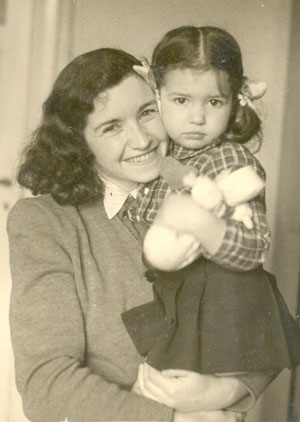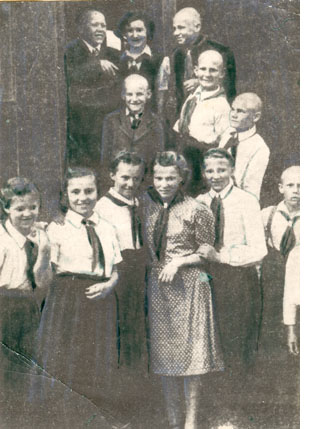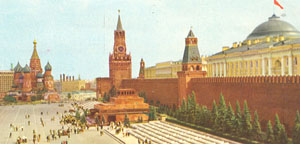
I Am Going to MoscowCHAPTER 1 During the three decades after it actually happened I have told many times to my family, friends and even some people I had met by accident how I had left Riga for Moscow four days before the day the war started. Every time I did so the events of that day and the days that followed came back to me as clearly as if it had happened yesterday… In the middle of June1941 it happened often enough that I had to go to work to the offices of the Komsomol Central Committee and not to the Pioneers' Palace: once I had to write an article about the Pioneers' camp in Ropazhi and on other occasions I had to prepare some material there. On Tuesday, the 17th of June 1941, the Riga Opera staged the premiere performance of the opera "Banyuta"(an opera by a Latvian composer A.Kalnins – Tr.). I attended that performance and saw there a group of writers who came to Riga from Tadzhikistan. I even made my acquaintance with one of them during the intermission. He told me that their delegation will spend ten days in Latvia. I did not like "Banyuta" and did not even stay till the end, especially as tomorrow, Wednesday, I had to be at the Central Committee offices again. Wednesday morning I put on my nice navy suit, took with me Iren's little shoes that had to be taken to the shoemaker and went off to the Central Committee offices. The first thing I heard there was the sentence said by the Secretary, Nata Busse: "You aren't going anywhere from here because at 4.00 in the afternoon you will be going to Moscow with a group of our best Pioneers whom we are sending to the Artek camp in Crimea. It will be a prize for your good work!" This was like a thunder on a clear day. I could not even think at once about what was actually said to me, I could not imagine how this was going to work. To go away like that, without seeing anyone, without parting from Iren… Her shoes were in my bag, all she had left were her little red slippers…I did not even have a toothbrush with me… In the meantime, I was still being given additional instructions: "The Pioneers will be arriving here from all over Latvia during the next few hours. You shall have to pick up two of them from their orphanage here in Riga and two others from their homes. You shall now be given a car with a driver to take you to the 'militzia' (police) office so that you could get your passport right away. This has already been arranged!" All of this had to be dealt with right away: the children, the passport, trying to go home… After getting my passport I managed to convince the driver to take me to my apartment which was very close to the police offices. I wanted at least to leave a note at home and to take a few necessary things with me. The driver told me I had 10 minutes to collect my things and I came down with a very small case and my coat. Then the real rat-race started: the driver drove me to pick up a girl whose parents eventually refused to let her go as they were afraid that she should make such a trip. Then we drove to the other side of town to pick up Rudik Yohanson and drove on to the orphanage where we picked up Elsa Peterson and Vilis Grube. By the time we came back to the Komsomol Central Committee offices many children were already waiting for us. Twenty four persons, including myself, were supposed to be going on that trip. Two of the youngsters, Dzidra Krumin' and Mirdza Lietskalnin', were supposed to board the train on route: the former in Ekabpils and the latter in Ogre, I think. They were told beforehand which carriage they should be boarding to join us and I was notified about their coming.
We were not bored on the train. We all had sleeping compartments, the children had with them tasty food to eat, we sang and joked as the train moved along. In the morning we all stepped out into the corridor and did our morning exercises. People were passing through our carriage on their way to the train restaurant and suddenly I recognized the Tadzhik writer whom I had met the night before at the opera. "Didn't you say that you were planning to spend 10 days in Latvia?" – I asked him. "Things turned out differently and we had to leave!" he said. Their whole group was there. Much later I realized that they must have received orders to leave Riga urgently and go home. The writer kept asking me where were we going, where was I going and why and he promised to show me around Moscow. He requested that I should meet him there on Friday, at 16.00, near the Bolshoy Theatre. He said that I would surely be able find it. The trip to Moscow took a long time: we left Riga on Wednesday, the 18th of July, at 16.00, and reached Moscow on Friday morning, the 20th of July. Right from the railway station I had to take the children to a special evacuation centre, where I had to register all the children, one by one, with those in charge of their further travel arrangements. After that I was allowed to stay on in Moscow for a week on my own, as a reward for my good work. A week in Moscow!!! It seemed like a dream at the time, a realization of the greatest of my wishes. It seemed that being in Moscow was the utmost of what one could wish for. Here we were in Moscow. I had received detailed instructions where to take the children and what to show them. I was not intimidated by the enormous city, by the noise, the traffic, etc. and I decided right away that we shall travel by the underground. I still cannot understand where I had found the confidence to do it. I was so sure of myself as I guided my Pioneers around town as if I had lived in Moscow all my life. After making sure that they settled down at the evacuation centre I went off to look for Aunt Frieda. I knocked on her door of her apartment and when she opened the door I saw her familiar face and her blue eyes which were so much like Lazar's eyes. We embraced each other and felt as if we had known each other all our lives. So, I stayed at Aunt Frieda's and went to visit the Pioneers from time to time. From the very first day in Moscow I was overcome with the desire to see as much as possible. I do not remember what I managed to see, but I did managed to see a whole lot of what I had heard of or read about. I also came, as agreed, to the Bolshoy Theatre at 16.00 to meet the Tadzhik writer. However, it transpired that he had no intention of showing me around Moscow. He wanted me to come with him to the "Moskva" hotel… Even though I was very much of an idealist then I did realize that I should not do that. We parted at the hotel entrance even though he asked me again and again to come up to his room "for five minutes only, he was waiting for a phone call"… I walked all around Moscow on my own, found my way around very quickly and was very excited about all I had seen. One of the first great impressions was, of course, the Red Square with Lenin's Mausoleum, the Spasskaya tower and the Kremlin wall with the row of green-blue fir trees next to it. I stood there looking at all of it as if I had been in a dream. I had never been anywhere and here I was in Moscow! Then I joined the long queue to visit the Mausoleum. How I Learned About the Beginning of the War On Sunday, the 22nd of July 1941, I decided to visit the Sokolniki Park that had, as I was told, a large children's section. The same day the Children's Theatre there performed "The Prince and the Pauper". I loved this book since I was a child and I decided to go and see the play. In the park's children section I made my acquaintance with the woman in charge, Evgenia Borisovna, and she took me over to the theatre. It was a lovely play with wonderful actors and I was absolutely enthralled. Suddenly, while sitting in the dark watching the play, I felt that someone sat down next to me. It was Evgenia Borisovna. She said: "You know, there were some joyful news. We are now fighting the Germans!"… I just sat there, without moving. I just looked at my watch. It was half past twelve. I went on watching the play and kept thinking: what will happen now? To me, to the children, to Iren, to everyone…
|
 First of all, they took me to the police office. There they gave me my new Soviet passport in the course of some ten minutes! Latvian citizens were supposed to obtain their new Soviet passports gradually, but the war intervened and therefore many of them evacuated into Russia while still bearing their old passports issued by the bourgeois Latvian state authorities. I received a new Soviet passport, but they forgot to take my old Latvian one and I have kept it. It was issued in the autumn of 1935. I was 21 at that time. This picture of me and Iren was taken in the spring of 1941.
First of all, they took me to the police office. There they gave me my new Soviet passport in the course of some ten minutes! Latvian citizens were supposed to obtain their new Soviet passports gradually, but the war intervened and therefore many of them evacuated into Russia while still bearing their old passports issued by the bourgeois Latvian state authorities. I received a new Soviet passport, but they forgot to take my old Latvian one and I have kept it. It was issued in the autumn of 1935. I was 21 at that time. This picture of me and Iren was taken in the spring of 1941.  Here we are at the railway station. The reporter from the newspaper "Jaunais Komunars"" ("The Young Communars") came to make pictures of us as we boarded the train. I got this picture 30 years later from the Latvian State Library, they made me a copy of it there. I am in the top row.
Here we are at the railway station. The reporter from the newspaper "Jaunais Komunars"" ("The Young Communars") came to make pictures of us as we boarded the train. I got this picture 30 years later from the Latvian State Library, they made me a copy of it there. I am in the top row.  The Mausoleum was very solemn and rather dark inside. People went along in line, one after the other, not stopping but turning back once more to get another look at Lenin's coffin. I visited Moscow later many time, but never managed to visit the Mausoleum again. I still love the Red Square and all the streets around it and I have always loved to see the Kremlin, no matter from what direction I approached it. I have always remembered the red brick Kremlin wall, the fir trees growing next to it and the Mausoleum nearby…
The Mausoleum was very solemn and rather dark inside. People went along in line, one after the other, not stopping but turning back once more to get another look at Lenin's coffin. I visited Moscow later many time, but never managed to visit the Mausoleum again. I still love the Red Square and all the streets around it and I have always loved to see the Kremlin, no matter from what direction I approached it. I have always remembered the red brick Kremlin wall, the fir trees growing next to it and the Mausoleum nearby…